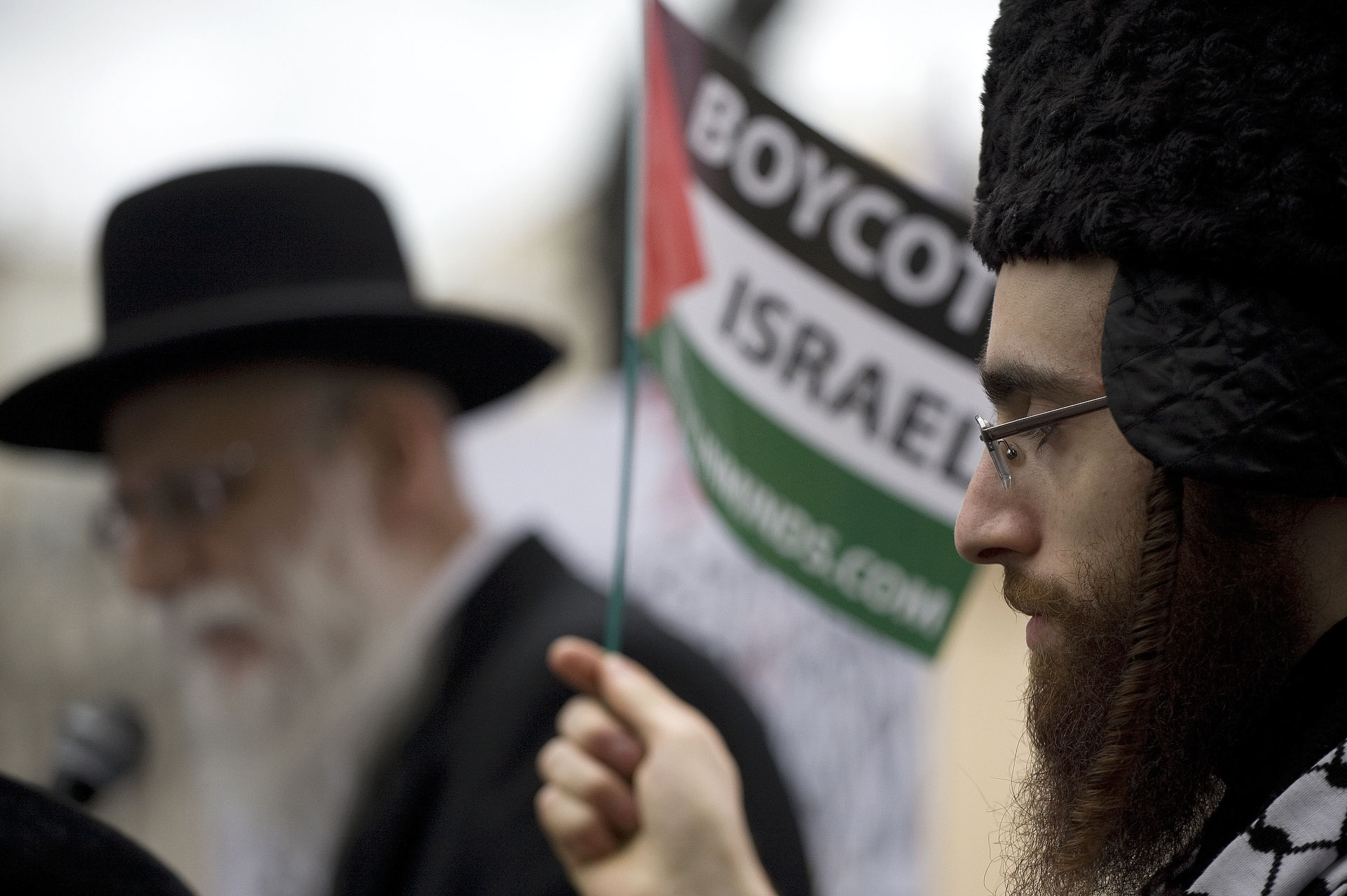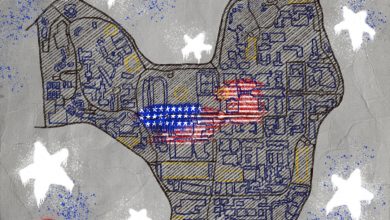Palestine Primer
[trigger warning: this article contains graphic depictions of violence]
Author Note: After doing extensive research, I offer my support to those who are attempting to reveal the atrocities committed by the Israeli government. I send my support to divestment. Complacency finances the Israeli military. Along with so many people in America, my tax money and my tuition dollars support this genocide. Unknowingly, so many of us fund organizations which profit off the murder of Palestinian peoples.
“If you’re not careful the newspapers will have you hating the people who are being oppressed and loving the people who are doing the oppressing”- Malcolm X
As an American citizen, I know that my opinion on this topic is already patronizingly flawed. Not only do I speak about a violence that I financially contribute to through taxes and school fees, I also know that this genocide can be much more aptly covered by those who are experiencing it. Therefore I have assembled a collection of other peoples’ analyses and news reports about the region in order to provide a single space where readers can access a large quantity of credible information about the Israeli occupation of Palestine. Feel free to jump around sections and click on the links provided for more information.
*It is important to clarify that Judaism (religion) is not Zionism (movement for the creation of a Jewish state). Many Orthodox Jews have voiced their opposition to Israeli expansion. Also, Jewish organizations such as Jewish Voice for Peace, NOIN: Not in Our Name: Jewish Voices Opposing Zionism, The Israeli Committee Against House Demolitions, Zochrot, JAO: Jews Against the Occupation, JFJFP: Jews for Justice for Palestine, Jews for Palestinian Right of Return, Jews Say No, IJAN: International Jewish Anti-Zionist Network, have all voiced adamant opposition to the Israeli colonial policies which have resulted in a genocide of the Palestinian peoples.
Here is a statement made by a Warsaw Ghetto survivor who opposes the Israeli occupation, and readers can also watch the documentary Israel vs Israel for more dissenting Israeli voices.
In this article, the criticisms of Israeli policies are not anti-Semitic rather anti-Zionist. Watch the documentary The Zionist Story for more information.
Since July 8th alone, over 1100 Palestinians have been murdered by Israeli forces. In order to understand the violence today it is important to briefly give historical context to the current diaspora (scattering) of Palestinian peoples.
Ancient World
In an incredibly simplistic summary of ancient history, both Arabs and Jews resided in the land now known as Israel/Palestine. The Jewish diaspora began occurring in approximately 6th century BCE with the conquest of the ancient Kingdom of Judah by Babylon. Though some stayed, many Jews fled. Zionists partly base Jewish claim to the land of Israel on this history (also see Biblical ties). On the other hand, Arab peoples have been documented living in the region since the year 630.
1920-1948
Here’s a brief introductory video to the 1920s and the end of Ottoman rule of the region:
As a result of the United Kingdom conquering the area known as Palestine from the Ottoman Empire during WW1, the UK was given a mandate to the region.
Because the British had promised to establish a Jewish national homeland in Palestine under the The Balfour Declaration of 1917, and also promised Palestinians that the land they resided on would be returned to the nationals living there under the The McMahon Agreement, both parties felt they deserved the land.
However, it was only after the Holocaust that the international community began to support Jewish settlement in what is now called Israel.
When the British Mandate was terminated in 1948, the United Nations developed the Partition Plan (1947) for Palestine which separated the nation into two separate states; Israel (the Jewish state) and Palestine (the Arab state). While most Zionists around the world reacted to the resolution with satisfaction, the majority of Arab leaders and governments rejected the partition as it resulted in a major loss of territory.
It seems that in order to compensate Jews for the horrors incurred by the Holocaust and Euro-Christian anti-semitism, the UN granted a much needed homeland to displaced Jews. However, the compensation for the massacre of six million peoples was not paid for by the nations who contributed to that violence. Palestine was forced to bear a disproportionate burden of the reparation: 56% of their homeland.
As a result of this partition, approximately 700,000-750,000 Palestinians were forced to leave their homes.
What is known as Yom Ha’atzmaut (Independence day) in Israel is simultaneously known as al Nakba (meaning “catastrophe”) and acts as a commemoration of displacement to Palestinians. This year marks the beginning of the contemporary Palestinian diaspora.
1967
After 1948, a string of wars broke out between Israeli and Arab forces. After the Six-Day War in 1967, Israel captured a significant portion of Palestinian land: Sinai Peninsula, Gaza Strip, West Bank, Old City of Jerusalem, and the Golan Heights (Israel no longer occupies the Gaza Strip).
For some Israelis this occupation meant a return to their homelands. For most Palestinians it meant displacement. The capture of this land lead to the dislocation of approximately 280,000-325,000 Palestinians.
Israeli forces then occupied the remaining 22% of Palestine. The boundary of 1967 marks what is known as the Green Line and the Palestinians who reside in this area do not have Israeli citizenship. The Israelis who reside in these locations live under Israeli civil law whereas the Palestinians live under Israeli military law.
Watch the documentary Roadmap to Apartheid for more information.
Present Day
Settlements
Since 1967, Israel has transferred many of its citizens to Jewish settlements on occupied Palestinian land.
Here’s a brief introduction to the settlements:
As Israel continues to develop colonies on Palestinian land, it violates Article 49 of the Fourth Geneva Convention which states that “the Occupying Power shall not transfer parts of its own civilian population into territories it occupies.”
Demolitions
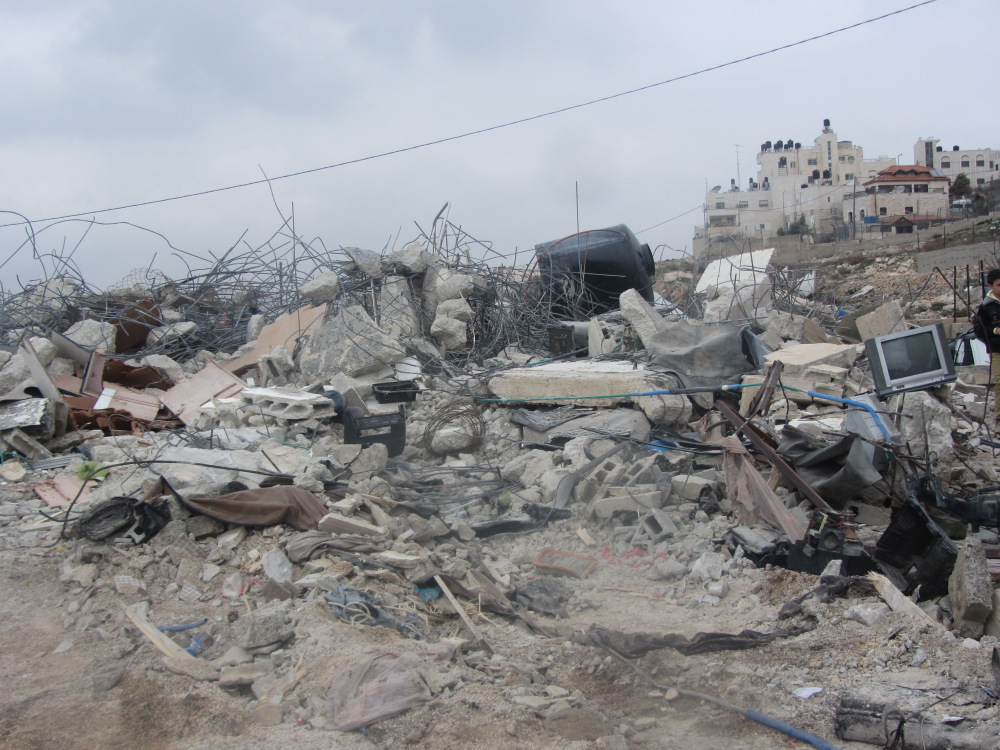
Since 1967, the Israeli policy of home demolition has destroyed about 27,000 Palestinian homes and other structures. Only two percent of the demolitions were recorded for security purposes.
Article 53 of the Fourth Geneva Convention, which provides protection for civilians living in war zones, states that “any destruction by the Occupying Power of real or personal property belonging individually or collectively to private persons…is prohibited.”
These home demolitions clearly violate international law.
It has been documented that Israel is also breaking at least eight other international laws which prohibits the pillage of resources (water) from occupied territories, the use of collective punishment of civilians, brutalization of civilian populations, outrages upon human dignity, inhumane treatment, and torture. This also includes the violation of the the Right of Return which gives ”any person the right to return to, and re-enter, his or her country of origin.” Under this law, Israel is required to permit Palestinians to return to their homes from which they were expelled in 1948. Israel has denied Palestinians this right, breaking international law.
First Intifada
In 1987, the people in the West Bank and Gaza rebelled against the military occupation of their state in the First Intifada. They fought through various methods including: refusing to pay taxes, nonviolent resistance, commercial strikes, but mostly by throwing stones and using sling shots against tanks and planes (view at minute 7:00). It has been reported that the Israeli Prime Minister at the time, Yitzhak Rabin, gave orders to “break the bones” of Palestinians participating in the uprising, and thus implemented the policy of “force, might and beatings” to suppress the revolt. The period marks the death of 94 Israeli citizens and 1,491 Palestinian peoples in the occupied territories.
Watch the documentary Occupation 101: Voice of a Silenced Majority for more information about the history of the occupation (the historical analysis begins at 16:00).
Second Intifada
The year 2000 marks the beginning of the Second Intifada (the next uprising against the Israeli occupation).
An Aljazeera news report documents that “Palestinian stone-throwers were met with Israeli snipers; gunmen, with helicopter gunships and tanks. What began as a popular protest movement quickly began to look like a war.”
It was not until 2001, after the death of 400 Palestinians (one year after the uprisings), that suicide attacks increased.
The Illegal Barrier AKA The Apartheid Wall
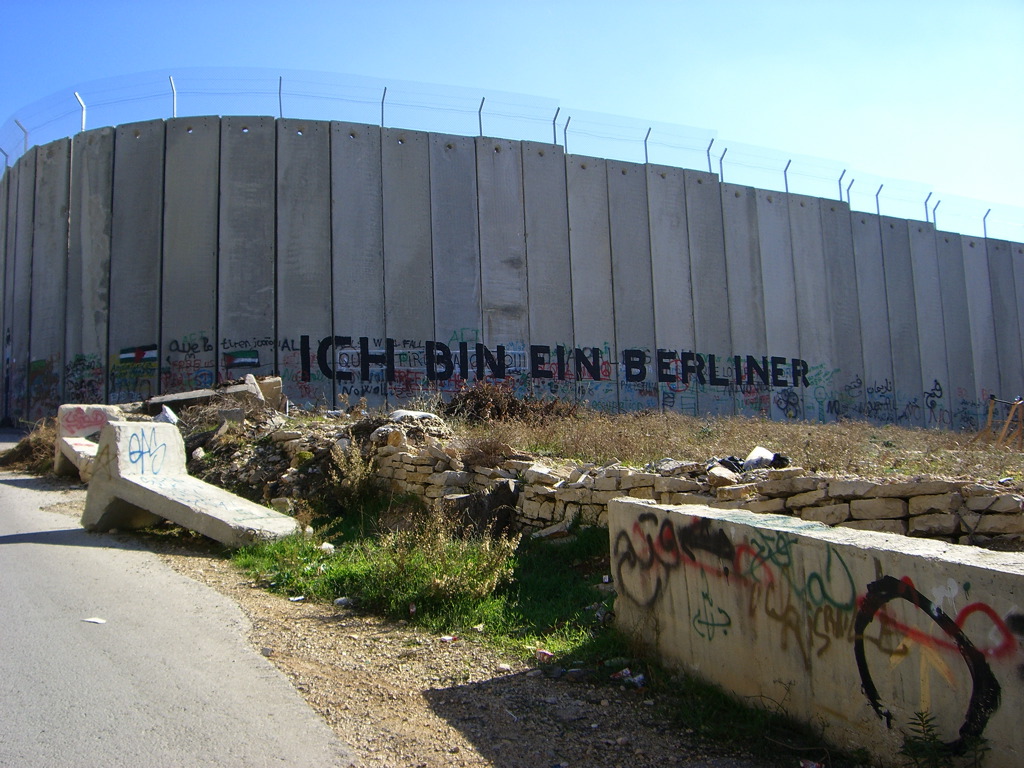
In June 2002, the Israeli government began building a wall (twice the height of the Berlin Wall) around the territories won in the 1967 war. The UN has since determined the barrier to be illegal.
A Fem Newsreport from last year stated:
“Proponents of the wall argue that [it] ensures the security of Israelis against suicide bombing attacks which the Israeli government […] reported [to have] decreased substantially since the Second Intifada and construction of the wall. […] By no means are these claims to security invalid. Every Israeli life is worth securing. However, I want to make clear that an Israeli life isn’t more valuable or more worthy of safety and security than a Palestinian life […] The security of Israelis should never come at the cost of Palestinian lives and basic human rights.”
In other words, even if this wall did exactly what it was supposed to and saved Israelis from the bombings (which would be a very valid and worthwhile policy), Palestinians are now unable to evacuate when bombs rain on their towns and cities.
Statistics show that Israeli cease fires result in sharp decline in Palestinian terror attacks. Increasing Israeli violence does not cease violence; only peace can do that.
B’Tselem, The Israeli Information Center for Human Rights in the Occupied Territories, also reports that “the restrictions on freedom of movement […] limit the access of Palestinian villagers to hospitals in nearby towns; the educational system suffers because many schools, primarily village schools, depend on teachers who live outside the community and must commute to the school; also family ties and social connections are adversely affected.”
Moreover, recent reports on the wall reveal that its main (often concealed) intention was to prepare Palestinian land for annexation.
This is evidenced by the fact that only 15% of the wall is actually on the green line (border); the remaining 85% separates Jewish Settlements from Palestinian towns and also Palestinian towns from one another.
When considering Prime Minister Rabin’s statement about the desire for expansion, that “[Israel will] create in the course of the next 10 or 20 years conditions which would attract natural and voluntary migration of the refugees from the Gaza Strip and the West Bank to Jordan,” the wall has ulterior motives.
In a 2005 report, BBC determined that not only did the barrier go against the 1948 border agreement, “Palestinian land [was] confiscated [from the 1967 border] to build the barrier; [also] hundreds of Palestinian farmers and traders are cut off from their land and means of economic survival.”
Watch the documentary 5 Broken Cameras (Netflix, Youtube) for a first hand account of non-violent protests to a barrier that was built on Palestinian land.
Checkpoints and Roadblocks:
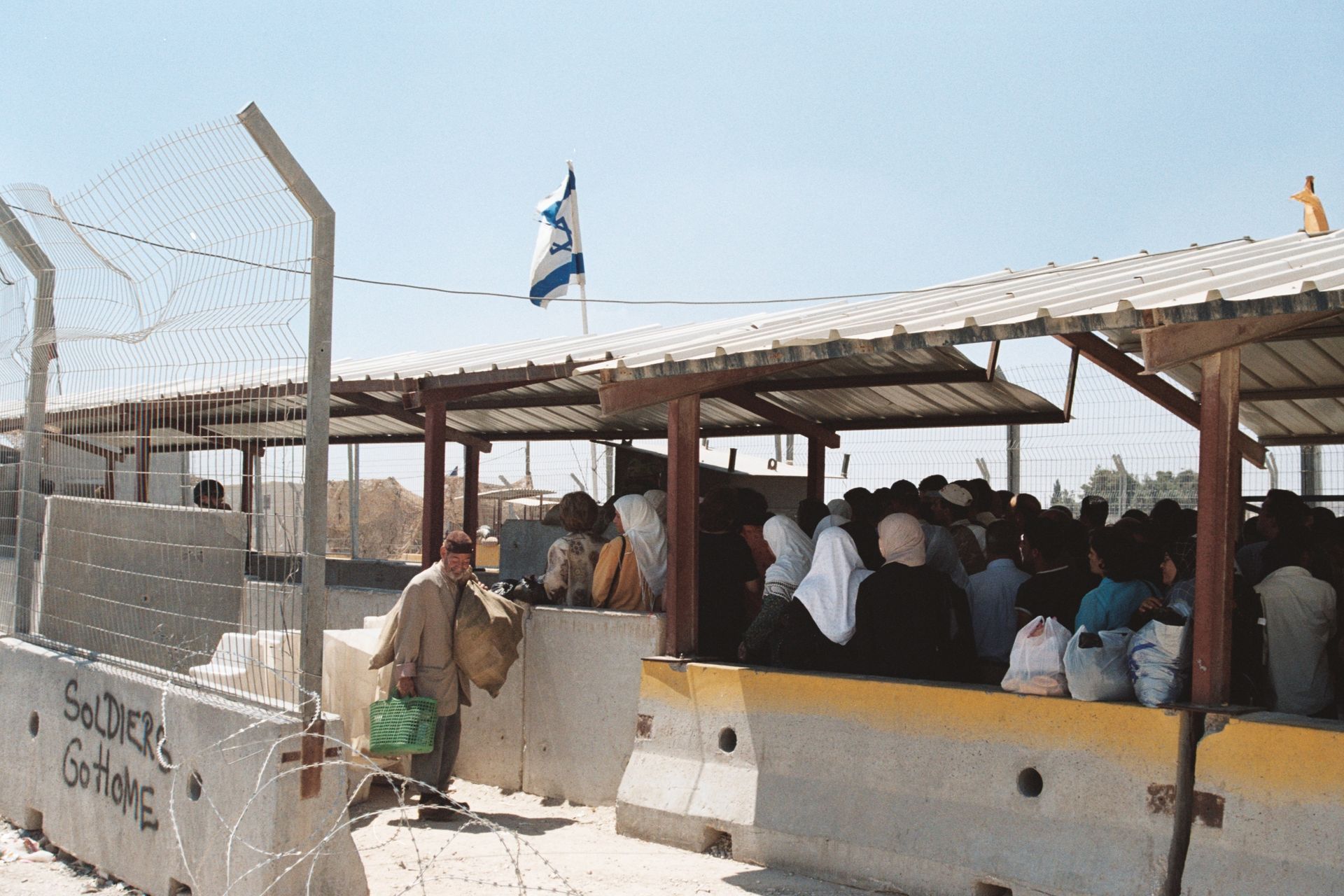
After the completion of the wall, checkpoints were established to monitor Palestinian movement. Much like apartheid South Africa’s infamous pass system, Palestinians must also carry IDs at all times.
“Palestinians need the ID cards to travel internally, including to schools, jobs, hospitals, and to visit family, because Israeli security forces manning checkpoints require these cards before allowing passage.”
A recent Washington Post article suggested:
“[These checkpoints actually increase] tendencies to support violent action (against Israel), rather than reduce them [because…] even some quarters of the Israeli military admit that humiliation at checkpoints is excessive, and perhaps counterproductive. For example, Judge Advocate General of the Israeli Defense Forces (IDF) Menachem Finkelstein, admitted that ‘there were many […]complaints that soldiers manning checkpoints abuse and humiliate Palestinians’ (Ha’aretz 2003) […] He was speaking from a strategic vantage, concerned with the potential danger this might cause Israelis down the road.”
Photographic evidence documents the human right abuses at the checkpoints.
There are over six hundred checkpoints located in the West Bank (Palestinian land) and only thirty six of these separate Israel and the West Bank.
These sites have been identified as leading causes for Palestine’s economic troubles.
The documentaries Palestine is Still the Issue and Roadmap to Apartheid detail numerous incidences at the checkpoints.
Curfews
Israeli forces frequently implement curfews which further restrict Palestinian movement and leave entire regions of the occupied territory under a 24 hour curfew (cannot leave homes except for few breaks which are designed to allow people to get food) for days, weeks or even months.
Amnesty International has determined:
“The widespread and prolonged closures, curfews and other restrictions on movement currently imposed cannot be justified on security grounds, discriminate against Palestinians, and are often used as a form of collective punishment in reprisal for attacks committed by Palestinian armed groups.”
Restriction of Imports
An “Amnesty International report [found] evidence of Israel depriving Palestinians of access to adequate water.”
Here’s a list of other restricted imports.
Israel stated that its ground invasion of Palestine on July 17th was in response to tunnels which run under Gaza into Israel. In order to prevent Hamas from possibly using the tunnels for weaponry, Israel has shut down at least thirteen. These same tunnels have have been recorded as the primary means for importing all kinds of commodities and restricted items such as diapers, flour, medicine, sugar, clothes, aluminum, copper, etc.
Arrest, Torture, Imprisonment and Detainment
As stated above, the Israelis who reside in Israel and the occupied areas of Palestine live under Israeli civil law, whereas the Palestinians live under Israeli military law.
The UN determined that Israeli court systems overstep international law because the military “system […] enjoys less independence and impartiality and does not effectively safeguard the individual rights of accused persons and suspects.” Reports have demonstrated that nearly 100% of military court cases in the West Bank result in convictions, a number too high to be properly releasing the falsely accused.
The documentary Israelis Torturing Non-Jewish children depicts the Israelis widespread institutionalized imprisonment of Palestinian children who are often placed in solitary confinement, blindfolded, signed/shown documents in Hebrew, transferred on the floors of vehicles, strip searched, and threatened by death, sexual assault, and physical violence (to both themselves and their loved ones).
The documentary captures the arrest of a five year old boy who was accused (he adamantly denied the accusation) of throwing stones at a Jewish Settler.
The movie also cites a UN report on Israeli child detention centers where Palestinian children were being kept overnight in large outdoor cages (even in the winter).
Statistics show that thousands of Palestinian children have been arrested since 2008. Before a military juvenile court was established in 2009, children were housed in the same detention centers as adults.
Until 1999, the Israeli military sanctioned a torture policy under the euphemism of “moderate physical pressure.” Amnesty International’s Annual Report on Israel revealed that there are still high volumes of torture reports from Palestinian prisoners.
Psychological Conditions
Watch Tears of Gaza for more information on the impact of the 2008 Gaza bombings on civilians and children. Children in the documentary shout that “even if you give us all of the world, we will never forget.”
The psychological trauma of the occupation has resulted in high rates of PTSD amongst children and adults in the region.
Attacking a Walled-In Community
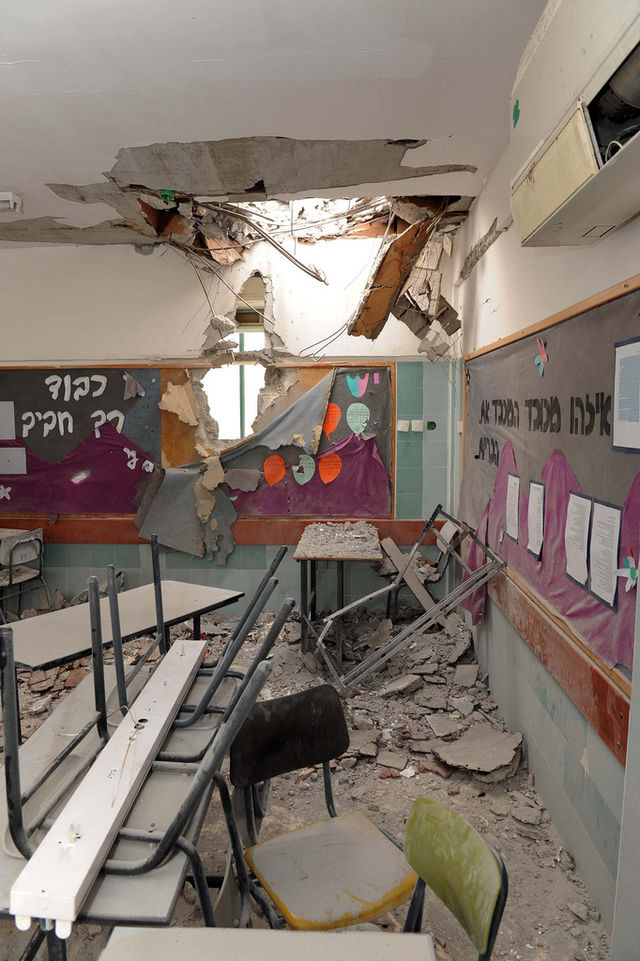
As one of the most densely populated cities in the world, an airstrike in Gaza Strip results in civilian death. Thus all missiles fired into Gaza constitute crimes against humanity as they target civilians.
The UN has reported that 80% (four out of five) of the Palestinians killed during the ongoing Israeli military offensive Operation Protective Edge have been civilians and one fifth of the dead have been minors. Since July 8th, over 1100 Palestinians and 51 Israelis have been killed.
Recent news reports justify Israeli airstrikes into Gaza saying that Israel “warns” residents before firing a missile into specific locations.
A Euro-Mid observer sites that:
“[This warning system also known as] “the ‘knock on the roof’ practice, in which Israeli forces fire a light missile on the roof of the home as a ‘warning,’ before firing another missile in less than a minute which destroys the home completely. These warning have been reported to be lethal, as causalities have been reported including injuries. Additionally, not enough time is provided for civilians to evacuate properly.”
Moreover, no evidence has been provided that the targeted homes are Hamas operatives (as suggested by Israeli forces).
Amnesty International’s Philip Luther (Director of the Middle East and North Africa Programme) stated,
“There is no way that firing a missile at a civilian home can constitute an effective ‘warning’. Amnesty International has documented cases of civilians killed or injured by such missiles in previous Israeli military operations on the Gaza Strip.”
Read the poem “Running Orders” by Lena Khalaf Tuffaha for a personal account of the “warnings.”
Hospitals have also been targeted. Democracy Now reports:
“Al-Wafa Hospital, the only rehabilitation hospital in Gaza and the West Bank, was shelled by Israel on Thursday. At the time of the attack, the hospital was filled with patients who were paralyzed, unconscious and unable to move. […] Many of our nurses, they lost control of themselves. They were unable to stand up on their feet. They left the hospital. Patients were left alone, unknown what will happen to them.”
Physicians for Human Rights have commented that:
“an attack on the hospital in this situation endangers the patients who cannot be evacuated, and is contrary to the rules of warfare and of international law. According to international humanitarian law, the claim that fighters from Hamas or other organizations are supposedly operating from within the civilian population does not in itself turn that population and civilian sites into military targets that may be attacked. This is even more true in the case of a public hospital from which some of the patients clearly cannot be evacuated.”
Human Shields
This same line of reasoning disproves the argument that Israeli military is blameless in regards to civilian death because of Hamas’ use of human shields (Amnesty International reported that Hamas does not use human shields.).
As Vox has reported, the use of human shields “does not actually force Israel to choose to bomb civilian buildings. It is entirely within Israel’s power to not bomb civilian buildings.”
Moreover, the Israeli government has used Palestinian human shields in multiple instances. They also recently justified the murder of Palestinian civilians in the following statement:
“The people who go into a house despite a warning do not have to be taken into account in terms of injury to civilians, because they are voluntary human shields. From the legal point of view, I do not have to show consideration for them. In the case of people who return to their home in order to protect it, they are taking part in the fighting.”
A Nation’s Right to Defend Itself
The U.S., along with many of its news reporting stations, have been quick to justify Israeli bombings/apartheid systems under the right of self defense.
Jadaliyya recently reported ,
“A state cannot simultaneously exercise control over territory it occupies and militarily attack that territory on the claim that it is ‘foreign’ and poses an exogenous national security threat. In doing precisely that, Israel is asserting rights that may be consistent with colonial domination but simply do not exist under international law.”
Moreover, the Israeli right to defend itself is not an extreme and unconstrained right. The response to Hamas (Islamic Resistance Movement) bombings is disproportionate on a mass scale. The bombing of civilians and children is not self defense. It is murder.
In the words of a British politician who made a Gaza statement in a UK Parliament debate,
“We should not equate the occupied with the occupier. We should not equate a refugee population of 1.7 million imprisoned in a tiny strip of land with the prison guards. We should not equate terrorists firing rockets with a supposedly civilized state that is systematically killing women, children, elderly and disabled people.”
Since 2001, there have been a recorded 28 fatalities from Gaza rockets fired into Israel. These deaths have been rightly condemned, but they do not justify the thousands of Palestinian fatalities since 2001, over 1100 of which were murdered by Israeli forces over the past two weeks.
Jon Stewart’s segment on Gaza addresses this disproportionate attack.
What about the Palestine’s right to defend itself?
On July 7th, the Huffington Post released an article which stated,
“If Israel has the right to defend itself by launching air strikes that have destroyed Palestinian homes and schools, then surely Palestinians have the right to protect themselves from the brutal and escalating Israeli violence.”
A Mondoweiss article makes a similar statement:
“[Are Hamas bombings] aggression or are they a response to aggression? Is it the indigenous […] population that has been genocided, forcibly removed and marginalized from their lands […] over the last few centuries? From an ethical perspective that demands a very different response than if another economic power like Germany, China or the U.K. were firing missiles for reasons of economic gain through imperialist war.”
Regardless, as Ynetnews recently reported,
“The missiles that are now being launched against Israel, each and every missile constitutes a crime against humanity, whether it hits or missed, because it is directed at civilian targets…Therefore, targeting civilians, be it one civilian or a thousand, is considered a crime against humanity.”
That being said, neither UCLA nor the U.S. government funds Hamas; they fund the Israeli military.
U.S. Aid to Israel
In 2012, The Guardian reported:
“Israeli aggression is possible only because of direct, affirmative, unstinting U.S. diplomatic, financial and military support for Israel and everything it does.”
According to the Congressional Research Service,
“Israel is the largest cumulative recipient of U.S. foreign assistance since World War II. To date, the United States has provided Israel $121 billion (current, or non-inflation-adjusted, dollars) in bilateral assistance. Almost all U.S. bilateral aid to Israel is in the form of military assistance, although in the past Israel also received significant economic assistance.”
Additionally, the U.S. has used 40 of its 79 vetos in UN resolutions on issues relating to the Middle East (the majority of which concern Israel). Its last veto was used to block a resolution determining the Israeli settlements illegal.
The documentary Occupation 101 (minute 44) details U.S. uncritical and consistent support of Israel and connects this support to the United States’ desire for a powerful ally strategically located in the Middle East. As the fifth largest nuclear power in the world, Israel is located near the majority of oil producing regions. An article entitled Planned Chaos in the Middle East –and Beyond contributes to this analysis by stating:
“While U.S. policies in the region are certainly irrational and conflicting from the standpoint of international peace, or even from the standpoint of the U.S. national interests as a whole, they are quite logical from the viewpoint of economic and geopolitical beneficiaries of war and international hostilities, that is, from the viewpoint of (a) the military-industrial complex, and (b) the militant Zionist proponents of ‘greater Israel.’”
Similarly, an article I wrote earlier this year connected capitalism and violence and gave examples of the ways in which governments and corporations neglect to respond to human rights abuses because they are economically profitable.
The documentary The Israel Lobby further discusses U.S. ties to Israel.
What Can We Do?
BDS: Boycott, Divestment, Sanctions
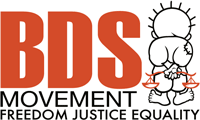
The people of Palestine have stressed the urgency to ACT NOW.
Gaza Civil Society has stated:
“We Palestinians trapped inside the bloodied and besieged Gaza Strip call on conscientious people all over the world, to act, protest, and intensify the boycotts, divestments and sanctions against Israel until it ends this murderous attack on our people and is held to account.[…] We ask: how many of our lives are dispensable enough until the world takes action? How much of our blood is sufficient? […] We call on you to not turn your backs on us. We call on you to stand up for justice and humanity and demonstrate and support the courageous men, women and children rooted in the Gaza Strip facing the darkest of times ahead. We insist on international action:
Severance of diplomatic ties with Israel
Trials for war crimes
Immediate International protection of the civilians of Gaza
Arms embargos on Israel, sanctions that would cut off the supply of weapons and military aid from Europe and the United States on which Israel depends to commit such war crimes;
Suspension of all free trade and bilateral agreements with Israel such as the EU-Israel Association agreement;
Boycott, divestment and sanctions, as called for by the overwhelming majority of Palestinian Civil Society in 2005”
According to BDSmovement.net, BDS is a “ Palestinian civil society [that has] issued a call for a campaign of boycotts, divestment and sanctions (BDS) against Israel until it complies with international law and Palestinian rights.”
They called for divestment in 2005 stating:
“We, representatives of Palestinian civil society, call upon international civil society organizations and people of conscience all over the world to impose broad boycotts and implement divestment initiatives against Israel similar to those applied to South Africa in the apartheid era. We appeal to you to pressure your respective states to impose embargoes and sanctions against Israel. We also invite conscientious Israelis to support this Call, for the sake of justice and genuine peace.
These non-violent punitive measures should be maintained until Israel meets its obligation to recognize the Palestinian people’s inalienable right to self-determination and fully complies with the precepts of international law by:
Ending its occupation and colonization of all Arab lands and dismantling the Wall
Recognizing the fundamental rights of the Arab-Palestinian citizens of Israel to full equality; and
Respecting, protecting and promoting the rights of Palestinian refugees to return to their homes and properties as stipulated in UN resolution 194.”
“The most basic step is to stop buying products and services of Israeli companies and, whenever feasible, of international companies involved in Israel’s human rights violations. Try to encourage your friends, family and community to join you in doing so.
It differs from country to country, but the most common Israeli exports include:
Fresh Fruit and Vegetables such as Jaffa citrus fruits and Israeli Medjoul Dates
Ahava cosmetics
SodaStream drinks machines
Eden Springs bottled water
Golan Heights Wineries and other Israeli Wines
There are many international companies that are complicit in Israeli violations of international law. Examples include HP, Caterpillar, Volvo, Hyundai, among many others.
Trying to boycott the products of every single company that participates in Israeli apartheid is a daunting task […]
It makes more sense to focus on optimal targets that are being targeted as part of national or international campaigns. Consumer boycotts are most effective when part of a broader campaign against a particular product or aiming to pressure a retailer to stop selling a particular Israeli product.”
In other words, boycotts in mass are the most effective. This means that not only is the BDS movement asking for divestment, but also to spread the word about divestment. Most importantly, companies need to be aware of the reasoning behind financial losses. Send emails, call, sign petitions, and contact the companies to express concern surrounding involvement in the occupation so companies become aware of the reason they are losing money.
Similarly, the MiddleEastMonitor stated,
“Lists of Israeli products for you not to buy as a consumer are nowhere near as important as campaigns that can effect real economic and psychological losses against Israel.”
That being said, boycotting certain items can still be an effective form of nonviolent resistance. I have provided lists so that consumers can organize BDS campaigns around specific companies with documented contributions to the violence. Supporters of BDS can find products on this list or simply look at the product bar code. The number 729 indicates that the product was made in Israel. Here’s a list of the top ten products to avoid. The app Buycott also allows you to scan barcodes to see if the product contributes to the occupation.
The MiddleEastMonitor also asks people to:
“Pick a strategic BDS target in your workplace, university campus, whatever. Chose winnable battles and stay in it for the long haul. Boycotting Israel is not going to liberate Palestine: that is the job for the Palestinians themselves. But, in a way, it is the minimum we can do. Palestinians themselves are asking us to do it: so let’s inflict inflict more defeats on Israel using BDS.”
Here at UCLA:
During the 2013-2014 academic year, the UCLA organization Students for Justice in Palestine (SJP) drafted a resolution to divest our tuition monies from five companies that have profited off of the illegal Israeli occupation of Palestine.
SJP’s website states, “UC funds are collected by regents and invested on behalf of the entire UC community. The two main investment vehicles are the Endowment Fund and the Retirement Fund.”
On February 26th, USAC (Undergraduate Student Association Council) rejected the resolution of divestment. Various members of USAC who voted against the resolution had gone on free trips to Israel through pro-Israel groups: Anti-Defamation League (Sunny Singh: general representative and Darren Ramalho: Academic Affairs Commissioner) and Project Interchange (Lauren Rogers: Financial Support Commissioner). More conflicts of interest have since surfaced on Avi Oved’s vote.
A recent news report on Dailycal states:
“According to a document presented by a student from UC Riverside during public comments, Oved allegedly sent an email a few weeks before the 2013 Undergraduate Student Association elections at UCLA thanking Adam Milstein, a heavy supporter of pro-Israel organizations who also runs the Adam and Gila Milstein Family Foundation, for a generous donation to him and a campus political party.
In return, Oved — who was running for internal vice president with Bruins United at the time — promised to make sure that ‘UCLA would maintain its allegiance to Israel and the Jewish community’ and fight against the ‘oppression’ felt under the leadership of pro-Palestine members of the student government. In the email, Oved said Bruins United was excited to further strengthen its unwavering support for Israel and fight against those who were anti-Israel and against those supporting the active boycott, divestment and sanctions movement.”
Despite UC Student Association objections and the student petition to postpone his nomination, Avi Oved was appointed to the Board of Regents on July 16th. The same board of regents which invests UC funds into private companies, some of which support the occupation.
Five out of nine UC campuses have endorsed divestment (UC Berkeley, UC Irvine, UC Riverside, UC San Diego, UC Santa Cruz).
Staying Informed: News Sources
*B’tselem*
Middle East Children’s Alliance
Take Action
Sign Petitions!
-
“Condemn the Apartheid State of Israel for their Human Rights Violations against the Palestinian peoples.”
-
“Tell CNN: Stop Unfair Coverage of Attacks on Gaza!” (Refer to the documentary Peace Propaganda and the Promised Land: U.S. Media and the Israeli-Palestinian Conflict (2004), and this short clip on unequal news coverage of the illegal occupation of Palestine)
-
“Stop Arming Israel! Add your name to the call for a military embargo”
-
Hold Israel Responsible and sign a petition which says that “The denial of Palestinian human rights must end. Reaffirm that all Israelis and Palestinians deserve security, justice, and equality.”
-
“Take Action Against the Bombing of Gaza’s Civilians”
Email, Call, and Write!
-
Contact your congressperson and tell them to stop supporting genocide.
-
Write a letter to your local newspaper asking for coverage of attacks on Gaza
-
“Contact President Obama at (202) 456-1111 and the State Department at (202) 647-4000. Demand that they immediately withdraw U.S. military aid from Israel and call on Israel to immediately end its attacks. Tell them to stop supporting Israel’s crimes with our tax dollars.” You can also contact the Obama administration online at this site.
-
“Call the Egyptian Embassy at (202) 895-5400 and demand they open the Rafah border for injured Palestinians in need of urgent medical care.”
-
“Call Boeing. Boeing provides Israel with F-15A fighter jets and Apache AH 64 helicopters to attack Gaza. Boeing’s headquarters are located in Chicago. Contact Boeing at (312) 544-2140 and demand they stop giving Israel weapons to use against civilians in Gaza.”
-
Click here for a template letter/phone message to send to any of the above sources. Also refer to this list of public officials you can contact.
Donate!
-
Read about Islamic Relief USA and donate.
-
Donate to the Middle East Children’s Alliance.
Attend a protest!
-
There have been global protests in response to Israel’s military violence. Find one near you and participate.
Raise Awareness!
Click here to find out more about why justice in Palestine is a feminist issue.
In the words of Nelson Mandela,
“We know too well that our freedom is incomplete without the freedom of the Palestinians”

